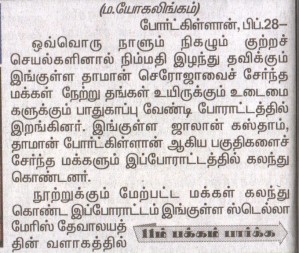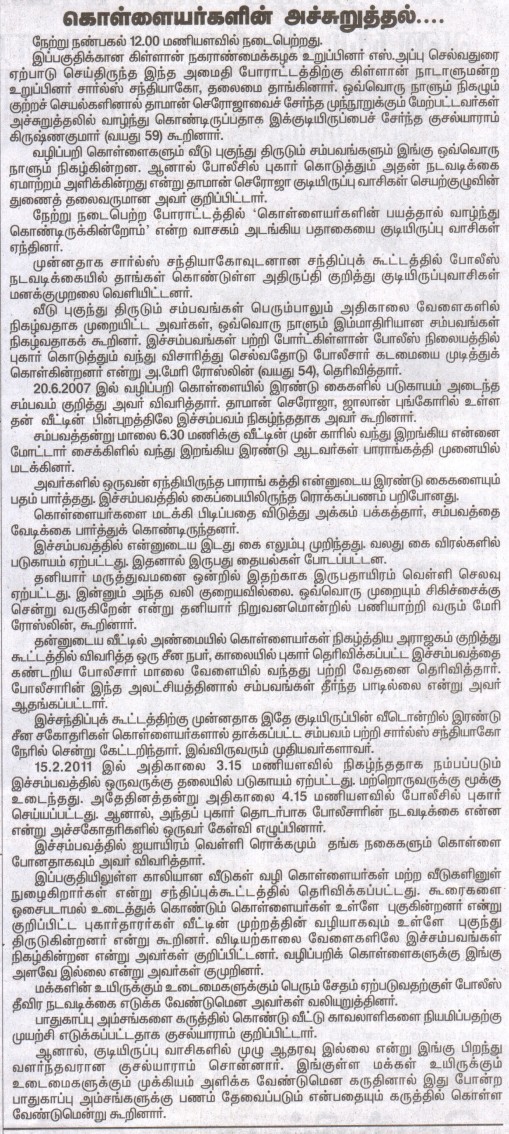Source :- themalaysianinsider
By Melissa Chi
February 25, 2011

Water was a basic necessity of life, said the appeals court judge. — Reuters pic
PUTRAJAYA, Feb 25 — The public has a legitimate expectation to know how water tariffs are determined, a dissenting judge in the Court of Appeal said today, disagreeing with a majority decision to keep secret the details of a concession deal between a private water company and the federal government.
Datuk Mohd Hishamudin Mohd Yunus said the court action to demand public disclosure of the deal was considered public interest litigation.
"Water is a basic necessity of life and any increase in tariffs will have an important impact on their lives.
"If one has to pay in order to have water, then the charge must be extremely nominal and affordable to the citizens. Then the process of determining the water rates or tariffs must be transparent. The citizens have a legitimate expectation to know the process involved in determining any increase of tariffs," he said.
Hishamudin accepted the respondents' argument that the government has a legal responsibility to the citizens and that good governance requires transparency, particularly in matters pertaining to basic human needs such as treated water.
Earlier today, the Court of Appeals had decided today to keep secret the concession agreement between Syarikat Bekalan Air Selangor (Syabas) and the federal government as well as an audit on the firm.
The majority decision was made by two of the three-man panel comprising Datin Paduka Zaleha Zahari, Datuk Seri Abu Samah Nordin and Hishamudin.
In 2007, Klang MP and co-ordinator for the Coalition Against Water Privatisation (CAWP), Charles Santiago, had filed for the judicial review seeking to declare the audit report and the 2004 concession agreement signed by Syabas, the Selangor government and the federal government as public documents.
In a landmark judgment, the High Court on June 28 last year ordered the contents of the documents to be disclosed, as requested by CAWP.
Judicial commissioner Hadhariah Syed Ismail had stated she was not convinced such a disclosure would be harmful to national security or public interest, as claimed by Syabas and the Ministry of Green Technology, Energy, and Water.
CAWP comprises the Malaysian Trade Union Congress (MTUC) and 13 others from Selangor, Kuala Lumpur and Putrajaya, including Santiago himself.
In his dissenting judgment today, Hishamudin also said the federal counsel appeared unaware of clause 45 of the concession agreement.
"But it is disclosed in the submission that according to clause 45, none of the three parties to the agreement namely, one, the federal government; two, the state government; and three, Syabas, may disclose the contents of the agreement to third parties without a mutual agreement of all three parties unless it is right by law," he said.
In this case, the state government and Syabas have no objection to the disclosure of the concession agreement, he said.
"The High Court judge had examined both the concession agreement and the audit report, and has come to the conclusion that there is nothing that is detrimental to the national security or public order, are disclosed except that the disclosures might invite public criticisms," he said pointedly.
He said that prior to the Cabinet meeting inquest, the audit report was already in existence and has never been classified as an official secret.
"The audit report was never prepared solely for the purpose of Cabinet discussion.
"To my mind, it cannot be the law that just [because] subsequently this audit report was discussed by the Cabinet, it just then becomes an official secret. There is no basis for the minister to withhold this audit report from the public," Hishamudin said.
CAWP lawyer, Ang Hean Leng, today said the High Court judgment should have been upheld as average users would be "adversely affected", adding that today's ruling meant consumers "do not have legal standing to request for information related to the water supply and water rates".
"We have to wait for the judgment to see what the majority [said]," Ang said, before adding that today's decision had baffled them.
Syabas was allowed to raise water tariffs after the company said it had complied with the requirement to reduce non-revenue water by five per cent.
Non-revenue water is the difference between water produced and water lost through leakages, faulty meters and theft.
The energy, water and communications minister had earlier rejected the coalition's request on the grounds that the concession agreement was confidential and the audit report, an official secret.
Syabas provides water for Selangor and both the Federal Territories of Kuala Lumpur and Putrajaya

















Tiada ulasan:
Catat Ulasan